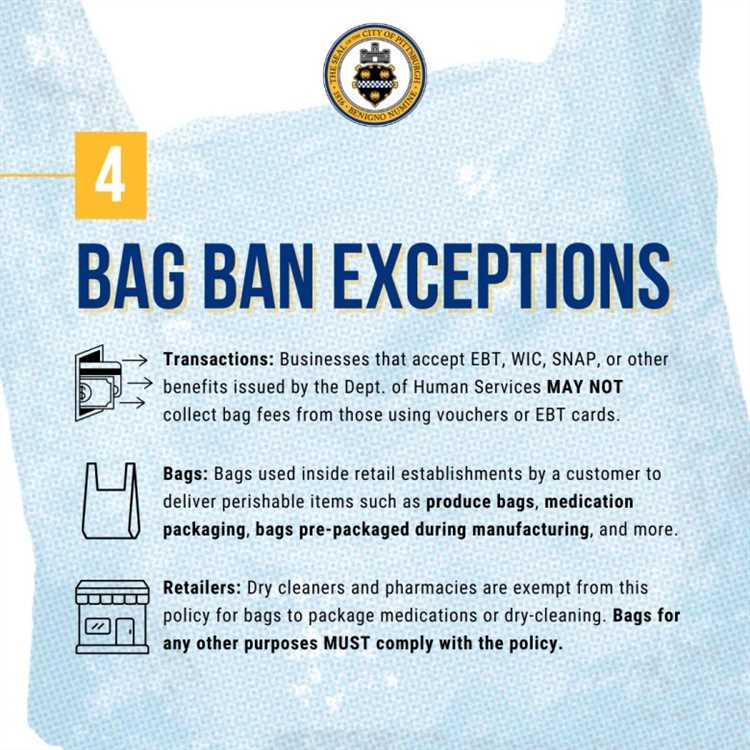
The city of Pittsburgh has recently implemented a ban on single-use plastic bags, joining many other cities around the world in an effort to reduce its ecological footprint.
This move comes as part of a larger sustainability initiative aimed at addressing the growing concern over plastic pollution and its impact on the environment. The ban is intended to encourage individuals and businesses to make more conscious choices when it comes to their use of plastic bags.
So, what does the plastic bag ban mean for the residents of Pittsburgh?
First and foremost, it means that single-use plastic bags will no longer be available at stores and other businesses within the city limits. Instead, customers will have to bring their own reusable bags or purchase paper or cloth bags provided by the businesses. This small change in shopping habits can have a significant positive impact on the environment, by reducing the amount of plastic waste that ends up in landfills or pollutes our rivers and oceans.
Moreover, it is important to note that the ban does not apply to all types of plastic bags. Some bags, such as those used for packaging loose produce or meat, are still allowed. Additionally, bags used for prescription medication or dry cleaning are exempt from the ban. This ensures that people can still access necessary items without inconvenience.
It’s also worth mentioning that this ban is not just the responsibility of consumers, but also businesses.
Businesses in Pittsburgh are required to comply with the ban and can face fines for failing to do so. Many businesses have already embraced the change and have taken proactive measures to find alternative packaging solutions. Some stores have offered discounts and incentives for customers who bring their own bags, encouraging sustainable choices. This ban provides an opportunity for businesses to showcase their commitment to the environment and attract environmentally conscious customers.
In conclusion, the plastic bag ban in Pittsburgh is a step towards a greener future and a cleaner environment.
By reducing our reliance on single-use plastic bags, we can make a positive impact on the environment and protect our planet for future generations.
- Overview of the Pittsburgh Plastic Bag Ban
- Benefits of the Ban on Plastic Bags
- 1. Reducing Plastic Pollution
- 2. Conserving Resources
- 3. Promoting Alternative, Eco-Friendly Options
- 4. Saving Wildlife
- 5. Enhancing Public Health
- Implementation Process of the Ban
- 1. Legislation and Regulations
- 2. Education and Outreach
- 3. Transition Period
- 4. Enforcement
- 5. Monitoring and Evaluation
- Alternative Options for Carrying Groceries
- Impact on Local Businesses
- Environmental Impact of Plastic Bags
- Q&A:
- Why did Pittsburgh ban plastic bags?
- When does the plastic bag ban in Pittsburgh go into effect?
- What are the alternatives to plastic bags in Pittsburgh?
- Are there any exceptions to the plastic bag ban in Pittsburgh?
- What are the penalties for violating the plastic bag ban in Pittsburgh?
- Why is Pittsburgh banning plastic bags?
- When will the plastic bag ban take effect in Pittsburgh?
Overview of the Pittsburgh Plastic Bag Ban
The city of Pittsburgh has implemented a ban on single-use plastic bags in an effort to reduce plastic waste and promote environmental sustainability. This initiative aims to encourage residents and businesses to switch to reusable bags and reduce their reliance on plastic materials.
The ban on plastic bags applies to all businesses within the city limits, including grocery stores, convenience stores, and retail shops. These businesses are no longer allowed to provide customers with single-use plastic bags at the checkout counter.
However, there are exceptions to the ban. Certain types of plastic bags, such as those used for packaging produce, meat, or bulk items, are still allowed. Additionally, businesses that qualify as small or independent retailers are exempt from the ban until a later date.
Residents are encouraged to bring their own reusable bags when shopping to comply with the ban. In an effort to promote this behavior, the city government has partnered with local organizations to distribute free reusable bags to residents.
The plastic bag ban is part of a larger sustainability initiative in Pittsburgh. The city is also working to reduce its overall plastic waste by implementing recycling programs and promoting the use of compostable materials.
Violation of the plastic bag ban can result in fines for businesses. However, the focus of the ban is on education and compliance rather than punishment. The city is committed to helping businesses and residents transition to more sustainable practices and is available to provide resources and assistance.
Overall, the Pittsburgh plastic bag ban is a step towards a more environmentally friendly city. By reducing plastic waste, the ban contributes to the preservation of natural resources and the protection of wildlife. It also fosters a culture of sustainability and encourages residents and businesses to take responsibility for their environmental impact.
Benefits of the Ban on Plastic Bags
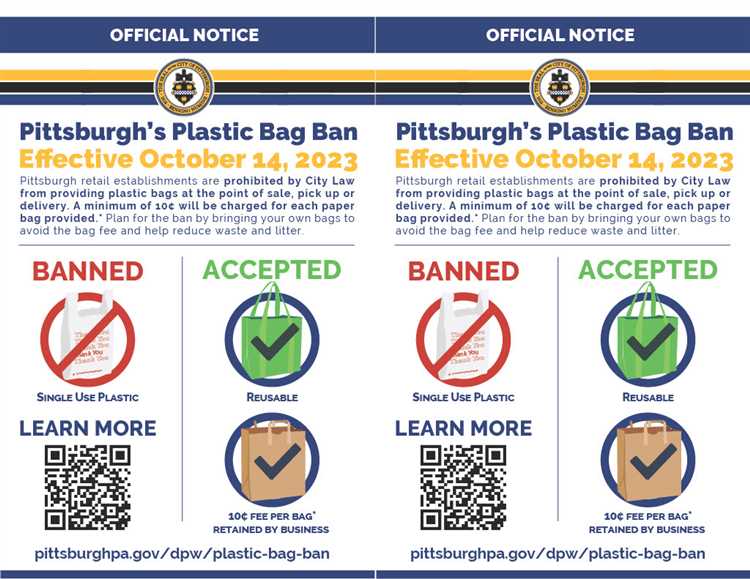
Plastic bags have become a major environmental concern due to their negative impact on ecosystems and human health. The implementation of a ban on plastic bags in Pittsburgh will bring several benefits to the community and the environment.
1. Reducing Plastic Pollution
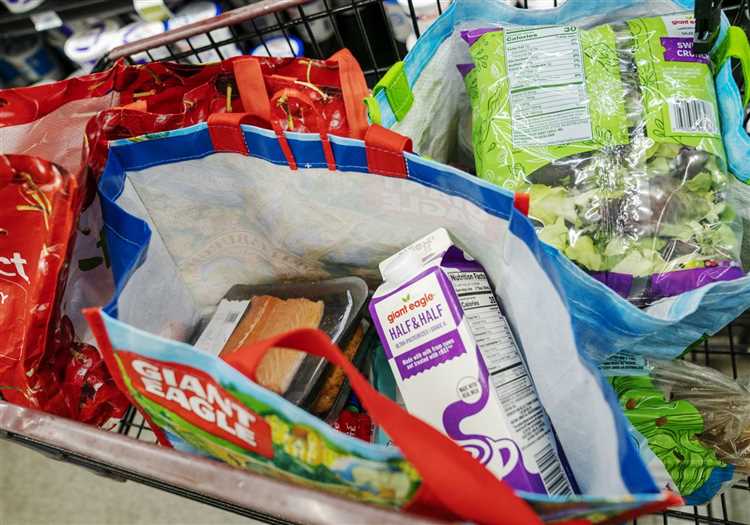
One of the primary benefits of the plastic bag ban is the reduction in plastic pollution. Plastic bags are a significant source of litter, and they often end up in waterways, where they harm marine life and pollute the ecosystem. By eliminating the use of plastic bags, the ban will help to keep the city cleaner and reduce the environmental impact of plastic waste.
2. Conserving Resources
The production of plastic bags requires the use of non-renewable resources such as fossil fuels. The ban on plastic bags will help conserve these valuable resources by encouraging the use of reusable bags made from more sustainable materials, such as cloth or paper. This shift will contribute to the overall sustainability and long-term ecological balance.
3. Promoting Alternative, Eco-Friendly Options
The plastic bag ban will create an opportunity for businesses and consumers to explore alternative, eco-friendly options for carrying groceries and other goods. Reusable bags made from organic materials offer a more sustainable and responsible choice that aligns with the principles of environmental conservation and reduces reliance on single-use plastics.
4. Saving Wildlife
Plastic bags pose a significant threat to wildlife, especially marine animals that frequently mistake them for food or become entangled in them. The ban on plastic bags will help protect wildlife by reducing the amount of plastic debris in their habitats. This will contribute to the preservation of various species and the overall biodiversity of the region.
5. Enhancing Public Health
Plastic bags can contain harmful chemicals that can leach into food, posing health risks to consumers. By eliminating plastic bags, the ban will help to prevent potential health hazards associated with their use. This will contribute to the overall well-being and safety of the community.
In conclusion, the ban on plastic bags in Pittsburgh will bring numerous benefits, including reducing plastic pollution, conserving resources, promoting eco-friendly options, saving wildlife, and enhancing public health. The implementation of this ban is a step towards a cleaner, healthier, and more sustainable future for the city and its residents.
Implementation Process of the Ban
The implementation process of the plastic bag ban in Pittsburgh involves several important steps and considerations. Here is an overview of the process:
1. Legislation and Regulations
The ban was first proposed and approved by the city council through legislation. The legislation outlines the specific regulations and requirements to be followed by businesses and residents.
2. Education and Outreach
Prior to the ban taking effect, there is a period of education and outreach conducted by the city. This includes public awareness campaigns, informational materials, and workshops to inform the community about the ban and its implications.
3. Transition Period
Following the education and outreach phase, there is typically a transition period where businesses are given time to adapt to the new regulations. This may include providing alternatives to plastic bags, such as reusable bags, or implementing new systems for bagging and packaging.
4. Enforcement
Once the ban is officially in effect, enforcement measures are put in place to ensure compliance. This may involve regular inspections of businesses, issuing warnings or fines for non-compliance, and working with local law enforcement to enforce the ban.
5. Monitoring and Evaluation
After the ban is implemented, ongoing monitoring and evaluation is conducted to assess its effectiveness and impact. This may include collecting data on reduced plastic bag usage, evaluating feedback from businesses and the community, and making adjustments to the regulations if necessary.
By following these steps, the city of Pittsburgh aims to successfully implement and enforce the plastic bag ban in order to reduce plastic waste and promote sustainable practices.
Alternative Options for Carrying Groceries
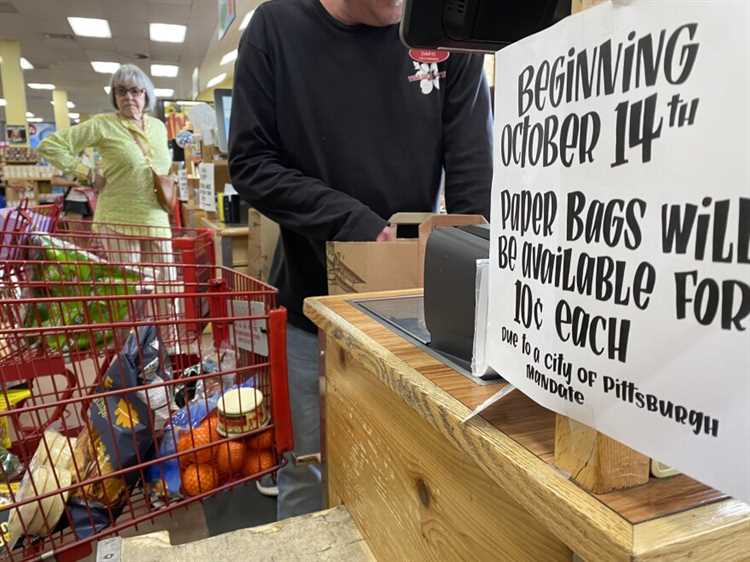
With the plastic bag ban in effect in Pittsburgh, residents are encouraged to explore alternative options for carrying their groceries. While reusable bags are an obvious choice, there are other convenient and eco-friendly options to consider.
One popular alternative is the use of cloth bags. These bags are durable, reusable, and can hold a significant amount of groceries. They are easy to store, can be folded up to fit in a purse or glove compartment, and are machine washable for easy maintenance.
Another option is the use of paper bags. Many grocery stores now offer paper bags as an alternative to plastic bags. These bags are biodegradable and can be easily recycled. While they may not be as durable as cloth bags, they are still a viable option for carrying groceries.
For those who prefer a more compact option, reusable produce bags are a great choice. These lightweight bags are designed specifically for carrying fruits and vegetables. They are often made from mesh or cotton and can be easily washed after use.
| Pros | Cons |
|---|---|
| Environmentally friendly | May forget to bring bags |
| Durable and reusable | Not as convenient as plastic bags |
| Easy to store and wash | May have limited carrying capacity |
Ultimately, the choice of alternative options for carrying groceries will depend on personal preference and lifestyle. It is important to remember that the plastic bag ban is a step towards a more sustainable future, and exploring these options can help reduce plastic waste and promote a greener Pittsburgh.
Impact on Local Businesses
The plastic bag ban in Pittsburgh has had a significant impact on local businesses, particularly those in the retail and grocery sectors. Many businesses have had to make changes to their operations in order to comply with the ban and find alternative packaging solutions.
One major impact is the additional cost that businesses now have to incur in order to provide alternative packaging options. Plastic bags were previously a cheap and convenient choice for businesses, but now they have to invest in more expensive alternatives such as paper bags or reusable bags. This cost increase can put a strain on small businesses with limited budgets.
Another challenge for businesses is the adjustment period for both employees and customers. Employees need to be trained on how to properly handle and package items without using plastic bags. This can be time-consuming and may result in a temporary decrease in efficiency. Customers also need to adapt to using alternative packaging and may need education on the importance of reducing plastic waste.
Additionally, businesses may face backlash from customers who are unhappy with the ban or find the alternative packaging options inconvenient. Some customers may choose to take their business elsewhere if they are dissatisfied with the changes. This can lead to a decline in sales and revenue for local businesses.
On the other hand, the plastic bag ban can also present opportunities for businesses to differentiate themselves and attract environmentally-conscious customers. Businesses that embrace the ban and actively promote their use of sustainable packaging options may gain a competitive advantage and attract a new customer base.
In conclusion, the plastic bag ban in Pittsburgh has had both positive and negative impacts on local businesses. While it has brought additional costs and challenges, it also presents opportunities for businesses to adapt and appeal to a growing demand for sustainable practices.
Environmental Impact of Plastic Bags
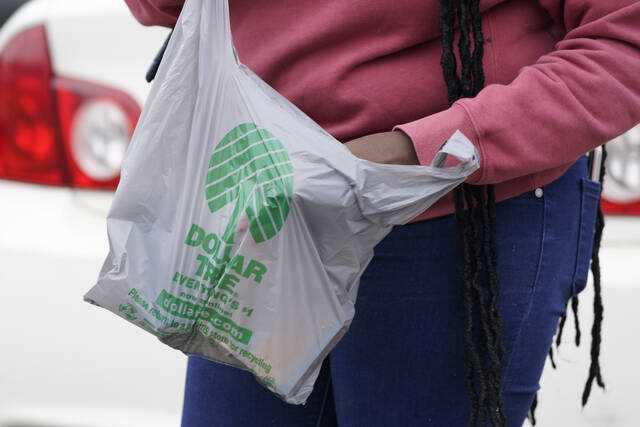
Plastic bags have become a significant environmental issue due to their negative impact on the ecosystem. Here are some key factors to consider:
- Resource Depletion: Plastic bags are made from non-renewable resources such as fossil fuels. The production and disposal of these bags contribute to the depletion of these limited resources.
- Litter: Plastic bags are lightweight and easily carried by wind, leading to widespread littering. They can end up in natural habitats, water bodies, and urban areas, affecting wildlife and polluting the environment.
- Marine Pollution: When plastic bags reach water bodies, they pose a serious threat to marine life. Marine animals can mistake them for food, leading to ingestion and entanglement, which often results in injury or death.
- Landfill Space: Plastic bags are not easily biodegradable, meaning they can persist in landfills for hundreds of years. This long-term presence in landfills takes up valuable space and contributes to the growing waste management crisis.
- Carbon Emissions: The production and transportation of plastic bags generate significant amounts of carbon dioxide emissions. These greenhouse gases contribute to global warming and climate change.
- Microplastics: Over time, plastic bags break down into smaller pieces called microplastics. These microplastics can contaminate soil and water, potentially entering the food chain and posing risks to human health.
- Alternative Solutions: To mitigate the environmental impact of plastic bags, individuals and businesses can opt for reusable bags made from sustainable materials like cotton or jute. Governments can implement policies to encourage the use of reusable bags and promote recycling programs.
By understanding and addressing the environmental impact of plastic bags, we can work towards a more sustainable and eco-friendly future.
Q&A:
Why did Pittsburgh ban plastic bags?
Pittsburgh has banned plastic bags in an effort to reduce waste and protect the environment. Plastic bags are not biodegradable and can take hundreds of years to break down. By banning plastic bags, Pittsburgh hopes to encourage the use of reusable bags and reduce plastic pollution.
When does the plastic bag ban in Pittsburgh go into effect?
The plastic bag ban in Pittsburgh went into effect on January 1, 2022. As of that date, businesses in the city are no longer allowed to use plastic bags for packaging or carrying goods.
What are the alternatives to plastic bags in Pittsburgh?
There are several alternatives to plastic bags in Pittsburgh. One option is to use reusable bags made from materials like cloth or canvas. These bags can be used over and over again, reducing the need for single-use plastic bags. Another option is to use paper bags, which are biodegradable and can be recycled. Some businesses may also offer compostable bags as an alternative.
Are there any exceptions to the plastic bag ban in Pittsburgh?
Yes, there are some exceptions to the plastic bag ban in Pittsburgh. Certain types of bags, such as those used for produce, meat, bulk items, or prescription medications, are still allowed. Additionally, businesses with less than 5,000 square feet of retail space are exempt from the ban. However, they are still encouraged to reduce their use of plastic bags.
What are the penalties for violating the plastic bag ban in Pittsburgh?
The penalties for violating the plastic bag ban in Pittsburgh can vary. Initially, businesses found in violation of the ban will receive a warning. However, repeated violations can result in fines of up to $500 per day. The city will enforce the ban through inspections and monitoring of businesses.
Why is Pittsburgh banning plastic bags?
Pittsburgh is banning plastic bags in an effort to reduce plastic waste and protect the environment. Plastic bags are often not recycled and can end up in landfills and oceans, posing a threat to wildlife and ecosystems.
When will the plastic bag ban take effect in Pittsburgh?
The plastic bag ban in Pittsburgh will take effect on March 1, 2022. Starting from that date, businesses will no longer be allowed to distribute single-use plastic bags to customers.